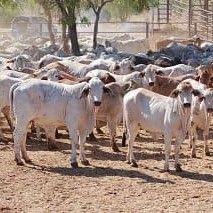 A grazing land value slump of monumental proportions could be brewing in live export-exposed regions of northern Australia, as the industry approaches two years without free and unfettered access to the dominant Indonesian cattle trade.
A grazing land value slump of monumental proportions could be brewing in live export-exposed regions of northern Australia, as the industry approaches two years without free and unfettered access to the dominant Indonesian cattle trade.
While the number of significant northern Australian cattle holdings sold in recent times has been so low it has made realistic land value assessment almost impossible, yesterday’s 2012 financial year report issued by the Australian Agricultural Co provided some clear signals of the broader land value sentiment.
Independent land valuations carried out last year by Herron Todd White on AA Co’s land assets across the Northern Territory and Queensland illustrate just how dire the property valuation situation has become.
Managing director David Farley told the financial market briefing yesterday that the company had written down the value on its balance sheet of its northern Australian properties last year by $41 million due to the suspension and subsequent restriction in live export trade into Indonesia.
He said the effects of the Federal Government’s June 2011 suspension of live cattle exports to Indonesia, and Indonesia’s subsequent halving of cattle imports quotas continued to affect property and cattle valuations across the region.
Of the $41 million written down last year, $8.1 million went through the company’s 2012 profit and loss statement as impairment costs.
AA Co now estimates total losses as a result of the suspension of live trade, including reduced livestock value and the related devaluation of its northern Australian properties, to have cost the company $51.2 million, up from $8.5 million in 2011.
It reported a $7.1 million decline in cattle sale prices in 2012 (all sale cattle, not just those exposed to live exports), partly attributed to the live export market influence resulting in an oversupply of cattle on the domestic market.
In the previous 2011 trading year – including the first six months after the onset of the Indonesian market closure and restrictions – AA Co wrote-down its northern land asset value by a further $9.5 million.
VRD district worst affected
 The major valuation decrease occurred in AA Co’s Victoria River Group properties, which suffered a 35.3 percent decline in value, according to Herron Todd White’s assessment.
The major valuation decrease occurred in AA Co’s Victoria River Group properties, which suffered a 35.3 percent decline in value, according to Herron Todd White’s assessment.
In comparison the company’s Barkly Group holdings, centred on Brunette Downs, fared a little better, being revalued only 6.8 percent lower. Presumably, that’s partly due to the greater accessibility from the Barkly Tableland region for young grower cattle to be transported back into Queensland.
Both areas were impacted by the live cattle suspension, Mr Farley said, but he pointed out that some other company holdings (presumably in Queensland) had increased in value, based in last year’s independent valuations.
“The ones that went up in value were the ones where we have invested capital to increase carrying capacity, but the properties directly and negatively affected in last year’s valuations were those that were live export-focussed,” he said.
“There is no speculation about the interruption of commerce in the live export trade to Indonesia on land values. It is a reality. When you take the major customer away, and the revenue away from an industry reliant on one primary customer, the consequences flow on. In this case, this year, our board took the advice of the valuers, on the write-downs on the northern properties.”
“But at the same time, its also important to reflect back on what’s happened with cattle falling out of specification, and the surplus cattle coming out of the north now, pressuring the southern cattle markets. The affects are cumulative, and the consequences are being felt on the balance sheets of companies like ours, as well as smaller producers, two years after the event.”
“Until restitution is made, that affect will be ongoing,” Mr Farley said.
The company noted the Federal Government has said it may be liable to pay compensation for the suspension. Mr Farley said it was pleasing to note that the Federal Government in last year’s budget made provision for compensation payments for affected producers, once they are challenged for it.
“It’s a matter now of how that plays out, commercially, but it could take years, given Australia’s slow, cumbersome and expensive legal system,” he said.
- See yesterday's report on receivers being appointed for the sale of the NT's Killarney Station
